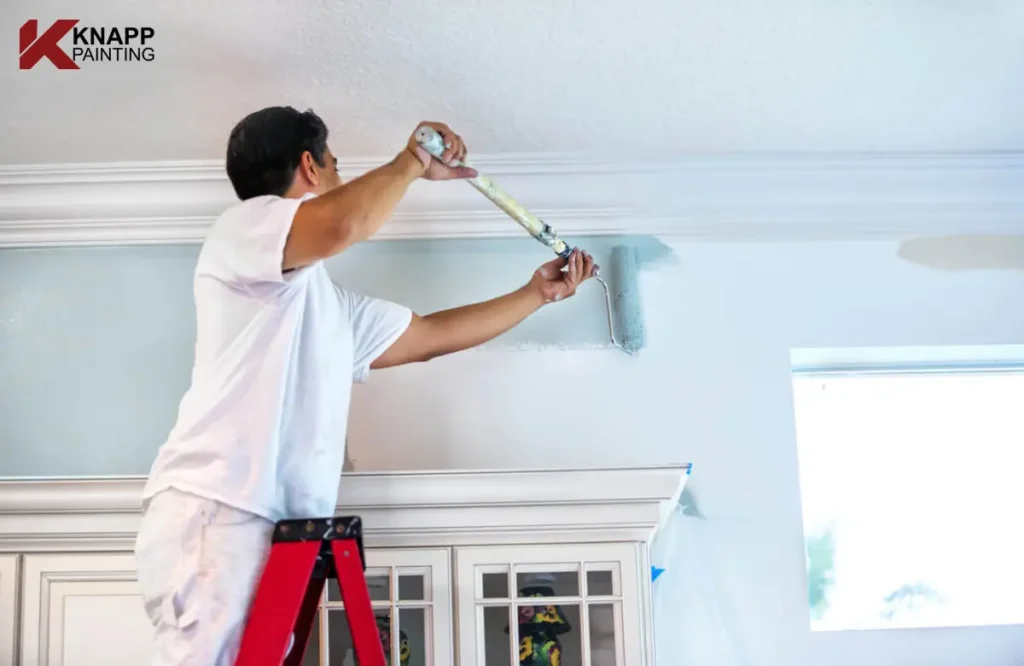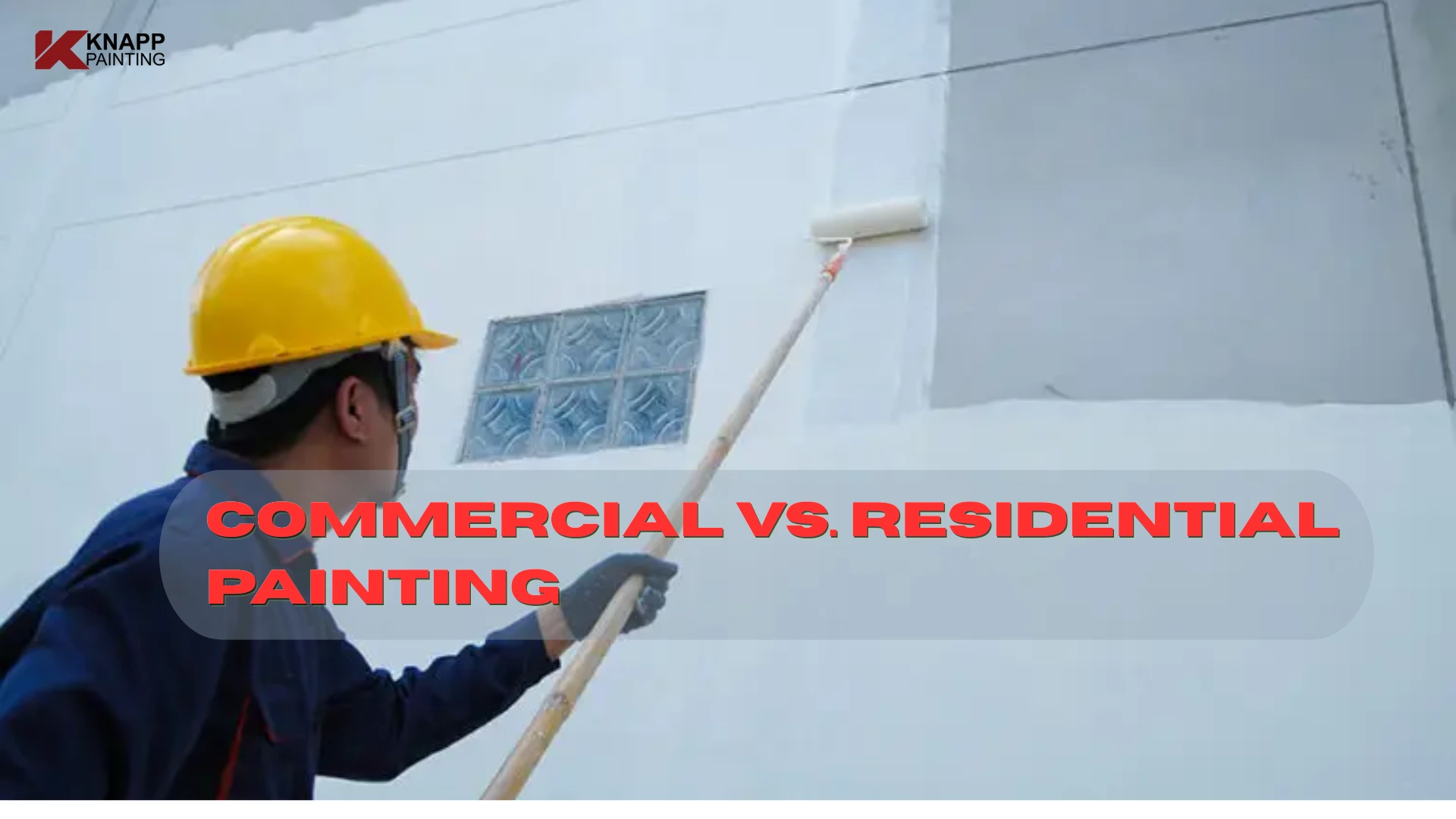Fresh paint does not just make a room or building brighter. It is able to totally change the appearance and feeling of space. This is not just any painting job. It is quite different to paint a large office or an industrial building as opposed to a house.
That is where one would have a difference between residential painting and commercial painting. The two are similar in terms of their use of skills, preparation as well as quality finishes, the difference however lies in the scope of work, methods as well as the challenges they work with. In this blog, we are going to deconstruct the key differences to make you know what kind of service is the most suitable for your needs.
What is Residential Painting?
The painting of homes is the whole thing of residential painting. This is a service oriented on single family houses, townhouses, condos, and apartments. The idea is normally to enhance comfort, develop personal style, and increase property value.
Residential interior painting services often include:
- Bed rooms, living rooms, and kitchens.
- Cabinets and trim
- Ceilings and accent walls
Homeowners normally desire different colors, textures and finishes. Artists in this area are concerned with cleanliness, detail and a home-like atmosphere.
What is Commercial Painting?
Commercial painting is bigger in size and it concerns business, offices, warehouses, and factory buildings. Such projects usually demand the use of new machines, the use of more personnel, and rigid scheduling.
Popular commercial interior painting services are:
- Office buildings
- Restaurants and hotels
- Shopping malls and retail shops.
- Warehouses and factories
It is not only about appearance but also longevity. Business paint works may need waterproofing, the ability to resist chemicals or traffic, or even extreme weather.
Scope and Size of Projects
The size and the scale of the work is one of the largest distinctions between residential and commercial painting. It is quite dissimilar to work on a one-family house than on a multi-story office or warehouse. The scale of planning, amount of labor and resources involved may drastically differ between residential and commercial projects.

Differences in Scale: Small Homes vs. Large Commercial Buildings
Home projects tend to be smaller such as a few rooms or an exterior of a home. Commercial construction projects may entail whole office complexes, high-rise buildings, or warehouses that will demand scaffolding, lifts, and huge crews.
Handling Multiple Units: Residential Homes vs. Office Complexes
Residential painters may also work on a single home at a time, whereas commercial painters may paint dozens or massive common areas. This would require additional planning and coordination.
Painting Techniques and Materials
The other significant distinction between commercial and residential painting is the paints and the methodology. Residential properties tend to require beauty and comfort oriented paints whereas commercial constructions tend to require paints that have the ability to withstand heavy traffic, weather as well as safety requirements. Materials and techniques are important factors such that the paint job is not only long-lasting but also efficient.
Specialized Paints and Coatings for Commercial Projects
The commercial painting involves the use of heavy-duty performance materials. This can be epoxy flooring, flameproof paint or weatherproofing exterior walls.
Paint Selection for Residential Homes: Aesthetic vs. Durability
Residential painting emphasizes more on style and comfort. Homeowners would prefer colors that would be suited to their personality, or trend, such as warm colors, bold, or neutral. Durability comes second, and then comes how it appears in a living room.
Timeframes and Project Duration
Another difference in residential and commercial painting projects is the time that they will take to complete. A house painting normally can be completed in days, whereas a commercial project can take weeks or even months to achieve its completion. The space size, scheduling requirements, and detailed requirements all impact the schedule.
Residential Painting: Quick Turnaround
The majority of residential occupations occupy a few days or a week. Home painters can be done sooner as the homes are not large and the time is not fixed.
Long-Term Commercial Projects
Business employment may take weeks or months. Planning will have to keep business processes out of the way. Work can be done either at night or on weekends to sustain businesses.
Workforce and Expertise
It depends on the individuals who do the paint work. Homework projects typically use fewer workers that have obsessed attention to detail and accuracy, whereas in commercial projects, one needs more workers with specialized skills to manage the complex equipment and larger areas. The degree of professionalism required will be as per the nature of the project.
Team Size: Residential vs. Commercial Painters
Most home projects need a small team of 2-5 painters, and then a small crew is sufficient. Commercial painting, however, can require dozens of painters, who have to collaborate in order to finish the project in time.

Skills Required for Each
- Residential painters are detail oriented, have clean edges and finishes.
- Commercial painters should be efficient, understand the industrial paint and be experienced with the use of large equipment.
Budgeting and Cost Considerations
In such matters as painting, price is significant. Residential painting tends to be small budgets based on material and labor to cover one house and commercial painting involves huge budgets based on covering of large areas, special equipment and rigid time constraints. This knowledge of the differences in costs aids the owners of the property in planning.
How Costs Differ
The residential painting prices are generally cheaper and they are calculated on a square foot basis, type of paint and the preparation.
The painters in the commercial activities are expensive due to:
- Larger areas
- Specialized paints
- Bigger teams
- Renting of equipment such as lifts or scaffolding.
Factors That Affect Price
- Type of paint or coating
- Surface condition
- Project size and complexity
- Timeline and deadlines
Safety and Regulations
A painting project entails safety and compliance. In home painting, the priorities are attached to securing the home owners, their family and their houses. Contractors in commercial painting are also under certain strict industry standards, building standards, and safety regulations to observe at the workplace. These laws make the work safe, legal and sustainable.
Commercial Painting: Compliance and Standards
There are safety regulations which have to be adhered to in commercial painting. Painters may be required to be certified in working at heights, compressed chemicals or special equipment. Insurance and building code is also needed in the businesses.
Residential Painting: Homeowner Safety
Safety in homes aims at safeguarding furniture, floorings and family health. The low-VOCs or earth-friendly painters apply to equalize the odors and the safe air quality in the house.
Impact on Business Operations vs. Home Life
Painting works have various impacts on houses and companies. To house owners, it can imply a change in daily activities or a change in temporary furniture. In the case of businesses, there are more at stake like painting may halt customer traffic, staff productivity or even making after-hours efforts to keep the business operational. One of the main differences between residential and commercial painting is balancing schedules and disrupting the minimum.
Minimizing Disruption in Commercial Settings
Any downtime in a business facility such as an office, restaurant or a store is loss of revenue. When business is going on Mothers and painters tend to work after hours or in shifts that allow the business to continue.
How Residential Painting Affects Homeowners
In the case of homeowners, it is disruption at a personal level. Artists have to paint around family schedules, pets and life. It is important in communication and respect of the space of the homeowner.
Benefits of Residential and Commercial Painting
A new coat of paint also does more than just beautify a room, regardless of whether it is a home or a business. Residential painting offers comfort, warmth, and personal style to the homes whereas commercial painting helps the business be unique, professional, and secure their property. The two categories of services are long-lasting value as they increase attractiveness, shield surfaces, and promote a friendly environment.
Benefits of Residential Painting
- Increases property and street appeal.
- Personalizes living spaces
- Coat of armor on the walls.
- Rapid and inexpensive upgrade.
Benefits of Commercial Painting
- Enhances brand image and professionalism.
- Guards against weather and damage to buildings.
- Improves morale and comfort of employees.
- Lowers maintenance expenditures in the long-run.
Tips for Choosing the Right Painting Service
- For Residential Projects:
- Find painters that are experienced in homes.
- Ask for color consultations.
- Reference check and review.
- For Commercial Projects:
- Select contractors that have high team capacities.
- Questions on safety certifications and compliance.
- Ensure that they are able to fit in your business schedule.
Conclusion
The same applies to residential and commercial painting, which have the same mission, i.e. producing beautiful, lasting finishes, but their purposes are very different. Personal spaces, style and comfort are best achieved through residential painting. Commercial painting is done on a large scale, which is durable and business oriented.
In selecting the service, you should take into account your property type, project size, budget and goals. The selection of an appropriate team is a guarantee of quality results that are sustainable.
Knapp Painting is a great place to learn more about the expert residential and commercial painting.
FAQs
Residential painting specializes in residential houses, both interior and exterior ones, to enhance the style and comfort of the house.
Commercial painting deals with bigger projects such as offices, warehouse and retail, that is, it deals with durability and efficiency.
Yes. Aesthetic paints are used in residential painting but industrial-grade painting is often needed in commercial projects.
Commercial painting tends to be more expensive in terms of size, elaboration, and medium.
Select according to the kind of property. Residential specialists are needed in the homes, and business owners require professional commercial contractors.













